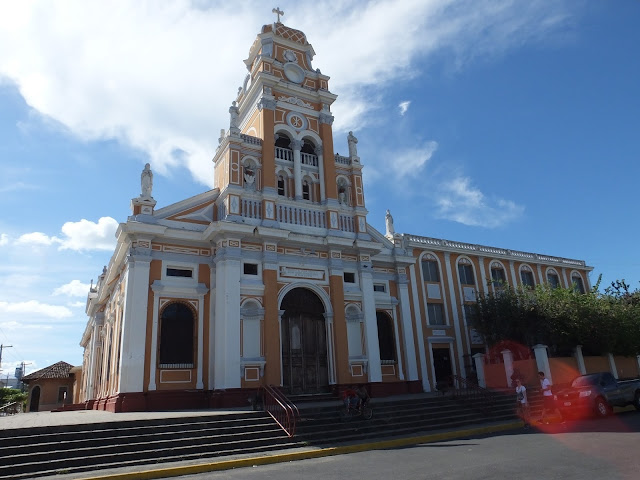After a few quiet days mainly spent reading and relaxing at
the hostel (and avoiding the crazy Halloween parties going on in and around
Granada), I was looking forward to the more somber and respectful celebration
of Dia de los Muertos (Day of the Dead). It’s a much more humbly celebrated day
in Nicaragua than you might see in some other Central American countries. I
walked the 20 blocks or so to the huge cemetery in Granada. It really is a
beautiful city, full of churches and brightly painted houses, some dating back
to colonial days.
The cemetery was full of people. Vendors outside the gates
and wandering all the paths sold everything from flowers real and fake, to
plastic statues of Jesus and the Virgin Mary, to all sorts of food and drink. It
was a hot sunny day and people ambled by with umbrellas or sat in the shade of
the large trees that dotted some areas of the landscape, or sat in the shade of
the mausoleums for their relatives. People carried armloads of flowers,
decorations, shovels, buckets, brooms, and paint for the graves of their
deceased loved ones.
I arrived in the afternoon and many people had come and gone
again in the morning, leaving fresh cement, fresh paint, fresh flowers, and
clean ground around the graves of their ancestors. But many others were hard at
work clearing away a year’s worth of weeds, leaves, dirt, and dust. Some were
mixing cement to patch the cracks that the intense tropical climate can create
so quickly. Other were repainting the graves in white. Those that weren’t able
to afford a plaque for the grave of their loved one repainted on the names or
sometimes simply a symbol. And further back in the cemetery away from the roads
were the more simple graves with only a rough cross made of stone or wood
marking where they lay. Some were marked with a name, but many others were only
the simple crosses, and still others that lacked even that, but were just as
carefully tended and taken care of as the large mausoleums near the front of
the cemetery. Some of the graves had flowers or trees planted in them that will
continue to grow into the future.
There were huge walls of graves of the young men who fought
against the Contras (who were trained and armed by the U.S. in the 1980s
because of fear of the socialist leanings of one of the poorest countries in
the region). Many young people on both sides died during this time and the
stacks of graves of young men in their 20s was a harsh reminder of the true
cost of war. The repercussions can still be felt in Nicaragua to this day.




















No comments:
Post a Comment